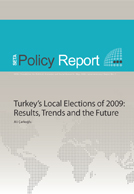The Foundation for Political, Economic and Social Research (SETA) and PollMark recently conducted a fairly extensive and comprehensive study with the participation of 10,577 people in 2,497 different spots.
The study, titled “Turkey's perception of the Kurdish issue,” presents interesting and important data and clues on how the nation perceives the Kurdish issue and what sort of solution it prefers, its reaction to the opposition's stance vis-à-vis the government's opening and the overall impression with respect to demands raised within the framework of the government's Kurdish initiative. The data and findings of this research will be elaborated in detail in the parts of this series to follow.
What is Turkey's most crucial issue? Only with this question can we adequately deal with the Kurdish issue. This context shows that multiple dynamics affect the Kurdish issue and that it is a multidimensional problem affected by a complex set of factors. There is no other current problem that affects both our internal and external relations as well as policies.
The Kurdish issue is able to influence support extended to political parties as well as the contents of social and political crises in the country. Moreover, it reflects the problems of the country in the era of normalization and constitutes one of the fault lines, barriers and tensions between the state and the nation. The parties unable to offer any solution or discourse with respect to this issue or parties focusing on this issue alone fail to represent the entire country. It affects our relations with Iraq, an important country because of Turkey's interests in the Middle East, and is one of the key issues to be resolved for greater achievements in foreign policy action.
In conclusion, the Kurdish issue is Turkey's most imminent and important problem in terms of its external and internal considerations and priorities. This issue transcends political interests or ideological engagements and has become the most important political issue that will affect all sections and social segments. As shown by research done over the last 25 years, this issue occupies a central place in the minds of the people. The people's responses to questions seeking to locate the most urgent problems of the country show that the Kurdish issue, the Kurdistan Workers' Party (PKK) and terrorism are problems that the state should address immediately.
This context adequately explains why security-oriented alternatives have failed to produce any viable resolution. Its central place in the social and political issues and priorities makes continuing to be ignorant of the issue impossible. Therefore, it is only natural for Turkey to seek a viable and lasting solution to this crucial problem. This is something that those who hold that Turkey's ability to deal with any of its problems should be attributed to external powers and actors fail to appreciate. Turkey is at the crossroads in the resolution of the Kurdish issue, and this is a transformation dictated and imposed by Turkey's need for normalization and internal consolidation.
The findings of the research show that while there are some inherent problems that we need to take into account, we should also be hopeful about a lasting solution in the future. There is wide agreement among the people that methods employed so far have failed to result in a solution. A stronger agreement is also available with respect to values that ensure Turkey's social integration. A common faith, values and past constitute the strongest tie that holds people of different ethnic backgrounds together. Belonging to the same homeland also appears to be an important connector between the Kurds and the Turks. Despite some differing views on political measures, respondents mostly agree on the importance of the issue and the need to include Parliament in the resolution process.
So what is the problem then? The problem mostly centers on the existing lack of confidence because of policies pursued so far. Different









